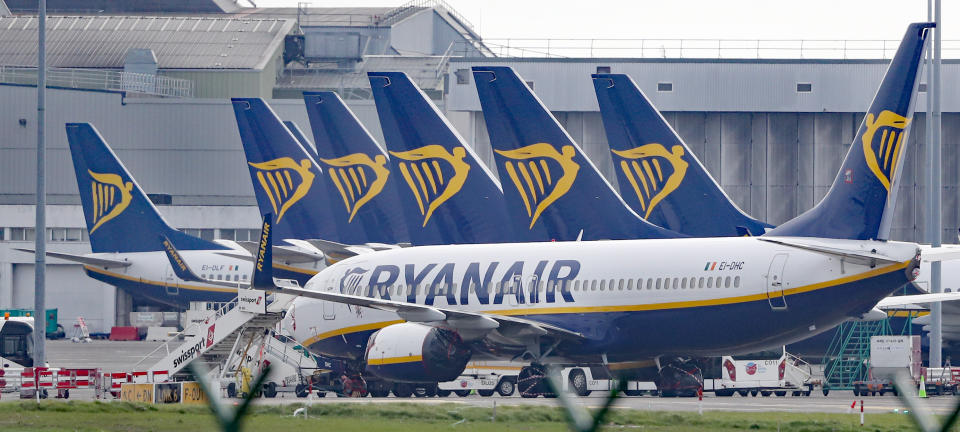Coronavirus: Ryanair to run 40% of flights from July

Ryanair (RYA.L) plans to start running 40% of its flight schedule from 1 July, as long as government restrictions on flights within the EU are removed and “effective public health measures” are put in place at airports.
The budget European airline hopes to start operating up to 1,000 flights per day, reintroducing 90% of its pre-coronavirus route network.
This is a huge increase on the 30 flights per day the airline has been running since mid-March between the UK, Ireland and the rest of Europe.
The airline said passengers will not be allowed to queue for the toilets onboard, but “toilet access will be made available to individual passengers upon request.”
Ryanair will also require crew and passengers to wear face masks or face coverings, and temperature checks will be in place at airports.
READ MORE: Coronavirus: UK government unveils roadmap for lifting lockdown for businesses
Any refreshments bought on board will have to be paid for through contactless card payment as cash will not be accepted.
All planes will be disinfected every night with chemicals which last for over 24 hours, according to Ryanair.
The Dublin-based carrier also intends to ask all passengers flying in July and August to fill out a form when they check in, stating how long their visit will be and where they are staying.
This information will then be passed on to EU governments to “help them to monitor any isolation regulations they require of visitors on intra-EU flights.”
Ryanair chief executive Eddie Wilson said: “It is important for our customers and our people that we return to some normal schedules from 1 July onwards.
“Governments around Europe have implemented a four-month lockdown to limit the spread of the COVID-19 virus.
“After four months, it is time to get Europe flying again so we can reunite friends and families, allow people to return to work and restart Europe’s tourism industry, which provides so many millions of jobs.”
READ MORE: British Airways owner warns ‘nothing positive’ for airlines in Johnson speech
Ryanair group chief executive Michael O’Leary, however, has been scathing about government’s quarantine plans for overseas visitors calling it “idiotic.”
O’Leary told ITV’s Good Morning Britain: “What’s ineffective is these kind of idiotic measures like a 14-day quarantine, which is completely non-science-based, when you can exempt the French and you can exempt the Irish.
“It’s nonsense and it has no effect in limiting the spread of COVID-19.”
Ryanair passenger numbers fell 99.6% in April. It flew just 40,000 passengers across 600 flights. Ryanair had originally planned to run over 75,000 flights in April and last year carried over 13 million passengers in the same month.
The Foreign and Commonwealth Office has advised against all but essential international travel since 17 March, while domestic holidays have been banned as part of the UK government’s lockdown orders issued on 23 March.

 Yahoo Finance
Yahoo Finance 